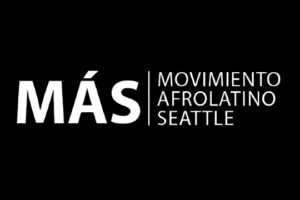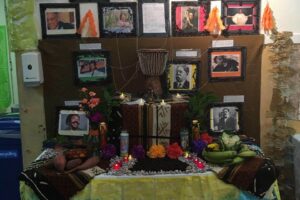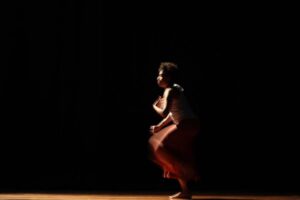¡ MÁS welcomed two guest artists from Africa Aaron Mulenga (Zaire) and Zuko Zikalala (South Africa)
Reflection of Milvia Pacheco
Last June and in collaboration with Heritage University, MÁS received in Seattle two artists participating in the Mellon Mays Undergraduate Fellowship from South Africa, Aaron Mulenga from the University of Cape Town (Visual Artist), and Zuko Zikalala from the University of the Witwatersrand / Johannesburg (Writer). The students shared with different Afro-Latino communities in Seattle from Sunday June 19 to Wednesday June 22. There were 4 days of meetings, dances, music, meals, conversations and reflections on Afro-Latino art and identity. On Tuesday the 21st we organized a closing dialogue around these issues. For many of us, it was an opportunity to meet again and explore the subject from the meeting with these two young Africans.
Afro-Brazilians, Afro-Panamanians, Afro-Peruvians, Afro-Venezuelans, Garifunas, Afro-Colombians and African-Americans, we come together in a circle of brotherhood and share the different ways we relate to our African heritage. The sound of the berimbau performed by Mestre Silvio Dos Reis opened the space for the meeting, synchronized our hearts, and invited us to celebrate our ancestors through capoeira. The dialogue began and our voices rose, timidly at first but eager to share the joy that the sound of the berimbao planted in each of us.
What is it to be Afro-Latino? How to track our identity?
For some of us the concept of Latino or Afro Latino is a concept acquired after immigrating to the United States. A question is created each time you have to check a classification box on each document to be processed: if you are white, black American, American Indian, Latino, other… what am I? How I look? How do you see me? How do I identify myself?
Reflections arose such as that in our countries of origin we did not ask ourselves those questions; the need to define or identify ourselves in a specific ethnic group did not arise in us; We were citizens of that country. For some, the problem was centered on a socioeconomic conflict or because they were classified by education levels. Or in the particular case of the Garifuna who identify themselves as a community that shares a cultural heritage regardless of the country where they were born. “I don’t know if I’m Latino or Afro-Latino, I know I’m Garifuna.” Said Yoelin Connor, one of the leaders of the Garífuna community. Now, I ask myself: am I Latino because I was born in a certain geographical context? or because I identify with what the concept reflects for me? Latino and Afro-Latino are parallel terms that do not repel each other, they coexist intertwined in the complexity of our miscegenation, but for me, identifying as Afro-Latina is a way of highlighting and making visible the contribution or heritage of the African culture that lives in one, that daily co-create the being we become. By saying I am Afrolatina, I restore the value of blackness in me. It is true that in South America Afro-Latin communities are related to the poorest social strata or communities settled on the Caribbean coast. This does not mean that there is no ethnic-racial problem in South America, or that what we are dealing with is only a class problem. I believe that in our countries racism is so internalized that it is necessary to go out and separate ourselves from our context in order to externalize those processes of racial oppression.
The Peruvian cajon entered the circle and the Rojas-Stewart family: Carmela, Monica and Jabali played a festejo (Afro-Peruvian Music and Dance) beautifully danced by Kiana Harris.
the dialogue continued…
Among the many topics we touch on, we reflect on the need to establish exchange bridges to meet and make known the artists and thinkers who have contributed to the diaspora as well as the need to get closer to African artists and thinkers who work to create visibility of the African heritage and the contribution of Afro-descendants. Aaron Mulenga one of our guests shared some photos of his work; in my memory and in my heart the image of three black women who represented the trinity in their work was captured: The Father, The Son and The Holy Spirit. The connection with my spirit was so strong that I felt myself rise from the chair, I could immediately identify with the image, I felt father/mother, son/daughter and holy spirit. I clearly understood the importance of reconstructing the symbols of power based on our image and likeness.
The night concluded with a poem written during the dialogue by Zuko Zikalala (another of our guests) and an impromptu dance by me, inspired by the words of Zuko’s poem. Moment and movement, past and present came together in a moment of inspiration, our ancestors were present to bless us through the collective creation of this moment.
The dialogue became a poem and the poem in movement, the movement in vibration and inspiration, the inspiration in the voice of our ancestors who embraced the present witnesses with their wisdom.
These spaces are definitely vital. It is necessary to meet, discuss, reflect and co-create in community the vision inherited from our ancestors, we were dreamed of; we must continue dreaming the new generations.
~ Milvia Pacheco
MÁS wants to first thank our guests Zuko Zikalala and Aaron Samuel Mulenga for these three intense days of so much learning, for their important questions, for their art and so much sharing. We also want to thank Yesenia Navarrete Hunter who thought of, suggested and facilitated this meeting. A special recognition to Milvia Pacheco , who did all the coordination and detailed planning of this meeting; To Siri and Etienne Cakpo for welcoming our guests into his home; to David Blanco Peña for all the transportation and other logistics support; to our leaders and exceptional artists Yoelin Connor Djgarifuna Aguan , Martha David and beautiful daughters; to Silvio Dos Reyes , Leika Suzumura and all FICA Seattle ; to Blanca Prater and the beautiful people of Panama Folklore – Seattle ; to Sharon Cronin , Grupo Bayano , for its art and leadership; to KianaHarris , Jabali Stewart and Carmela Stewart for their Afro-Peruvian contribution to the dialogue; to White Santander , Mirta Wymerszberg and Reinier Valdés for everything offered and shared; to all the people who cooked and fed us in these intense days; to our families of Latin House and Lake Chad Café , to all the members of MÁS, our ancestors, fathers and mothers, companions and children; to our beautiful community that continues to grow, heal, connect and grow stronger every day. Millions of thanks to all of you. We are definitely STRONGER together!















